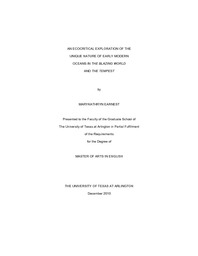An Ecocritical Exploration Of The Unique Nature Of Early Modern Oceans In The Blazing World And The Tempest
| dc.contributor.author | Earnest, Marykathryn | en_US |
| dc.date.accessioned | 2011-03-03T21:52:56Z | |
| dc.date.available | 2011-03-03T21:52:56Z | |
| dc.date.issued | 2011-03-03 | |
| dc.date.submitted | January 2010 | en_US |
| dc.identifier.other | DISS-10967 | en_US |
| dc.identifier.uri | http://hdl.handle.net/10106/5502 | |
| dc.description.abstract | Early modern perceptions of oceanic space diverged from standard perceptions of nature on land (or land-nature) because oceans presented a different type of wilderness. Because oceans defied early modern definitions of nature, they refused to support the developing mechanistic approach in the way that land-nature did. My argument begins with a chapter exploring science and nature in the early modern period. My second chapter expands this demonstration with an exploration of The Tempest. Shakespeare's self-reflexivity and exploration of boundaries in representing islands and oceans exemplifies their liminal position within nature. In my final chapter, I examine Margaret Cavendish's The Blazing World to examine how the liminal position of oceans within the humankind-nature paradigm necessitated a hybrid mechanistic-organic relationship and representation. These explorations illuminate how oceans, as an extraterrestrial space distanced from traditional, terrestrial nature, constituted a different kind of natural phenomenon and contributed to a global mentality. | en_US |
| dc.description.sponsorship | Tigner, Amy L. | en_US |
| dc.language.iso | en | en_US |
| dc.publisher | English | en_US |
| dc.title | An Ecocritical Exploration Of The Unique Nature Of Early Modern Oceans In The Blazing World And The Tempest | en_US |
| dc.type | M.A. | en_US |
| dc.contributor.committeeChair | Tigner, Amy L. | en_US |
| dc.degree.department | English | en_US |
| dc.degree.discipline | English | en_US |
| dc.degree.grantor | University of Texas at Arlington | en_US |
| dc.degree.level | masters | en_US |
| dc.degree.name | M.A. | en_US |

